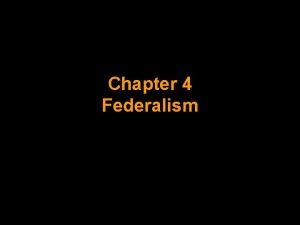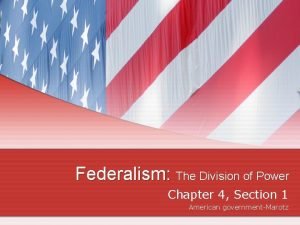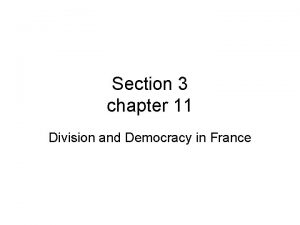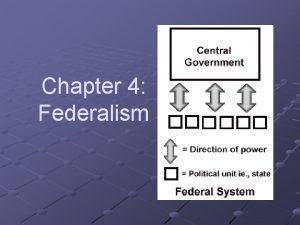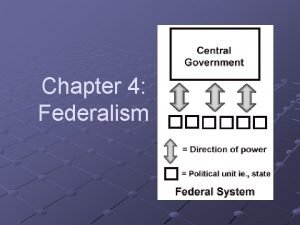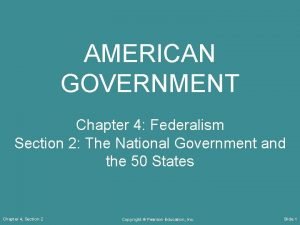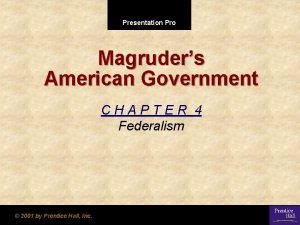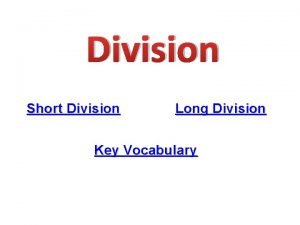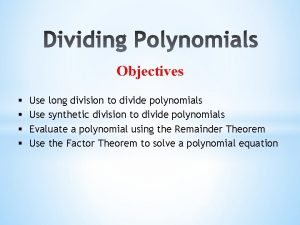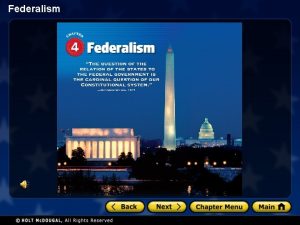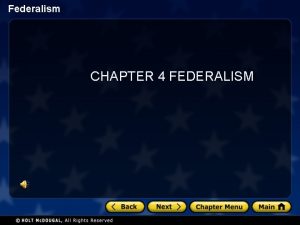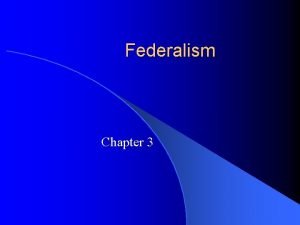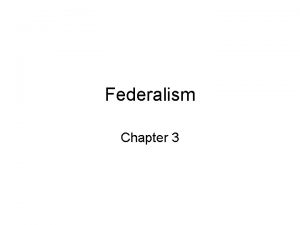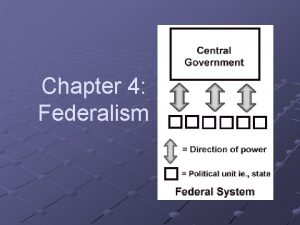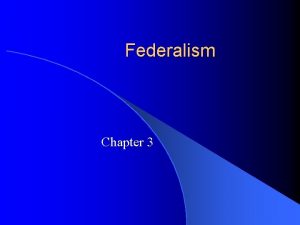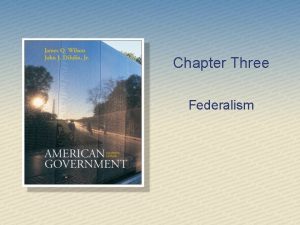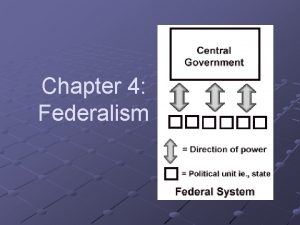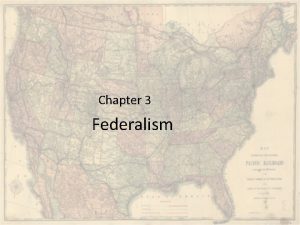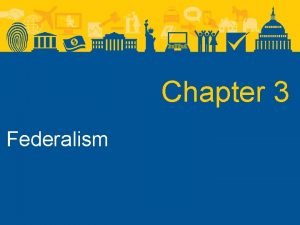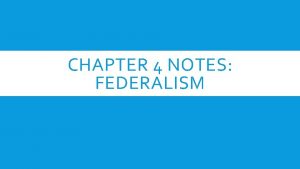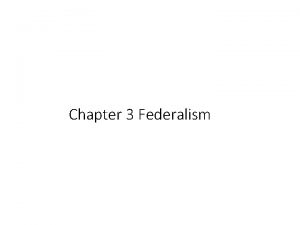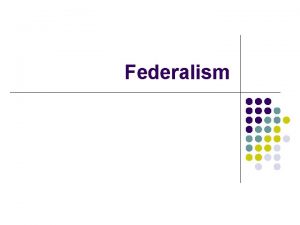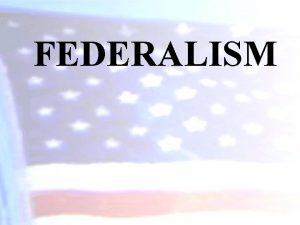CHAPTER 4 Federalism SECTION 1 Federalism The Division








![The States Powers are both given to the states [RESERVED] & Denied the states The States Powers are both given to the states [RESERVED] & Denied the states](https://slidetodoc.com/presentation_image/4bb32493ff2d0a29a5ed6fcfc8d9b6b7/image-9.jpg)

















- Slides: 26

CHAPTER 4 Federalism

SECTION 1 Federalism: The Division of Power SECTION 2 The National Government and the 50 States SECTION 3 Interstate Relations

Chapter 4 Section 1 Federalism: The Division of Power Basic questions – What is federalism, and why was it chosen by the Framers? What powers are delegated to and denied to the National Government, and what powers are reserved for and denied to the States? What exclusive powers does the National Government have, and what concurrent powers does it share with the States? What place do local governments have in the federal system? How does the Constitution function as “the Supreme Law of the Land? ”

Why Federalism? The Framers were dedicated to the concept of limited government. They were convinced (1) that governmental power poses a threat to individual liberty, (2) that therefore the exercise of governmental power must be restrained, and (3) that to divide governmental power, as federalism does, is to curb it and so prevent its abuse.

Federalism Defined Federalism is a system of government in which a written constitution divides the powers of government on a territorial basis between a central, or national government and several regional governments, usually called states or provinces. The United States Constitution provides for a division of powers, assigning certain powers to the National Government and certain powers to the States. There are LEVELS of Government

Powers of the National Government The National Government is a government of delegated powers, meaning that it only has those powers delegated (granted) to it in the Constitution. There are three types of delegated powers: The expressed powers are those found directly within the Constitution. The implied powers are not expressly stated in the Constitution, but are reasonably suggested, or implied by, the expressed powers. The inherent powers belong to the National Government because it is the government of a sovereign state within the world community. There are few inherent powers, with an example being the National Government’s ability to regulate immigration.

Powers Denied to the National Government Powers are denied to the National Government in three distinct ways: Some powers, such as the power to levy duties on exports or prohibit the freedom of religion, speech, press, or assembly, are expressly denied to the National Government in the Constitution.

Powers Denied to the National Government • Some powers, such as the power to levy duties on exports or prohibit the freedom of religion, speech, press, or assembly, are expressly denied to the National Government in the Constitution. • Finally, some powers are denied to the National Government because the federal system does not intend the National Government to carry out those functions.
![The States Powers are both given to the states RESERVED Denied the states The States Powers are both given to the states [RESERVED] & Denied the states](https://slidetodoc.com/presentation_image/4bb32493ff2d0a29a5ed6fcfc8d9b6b7/image-9.jpg)
The States Powers are both given to the states [RESERVED] & Denied the states because these powers are given to the national government

The States Powers Reserved to the States The 10 th Amendment declares that the States are governments of reserved powers. The reserved powers are those powers that the Constitution does not grant to the National Government and does not, at the same time, deny to the States.

The States Powers Denied to the States Just as the Constitution denies many powers the National Government, it also denies many powers to the States. Powers denied to the States are denied in much the same way that powers are denied to the National Government; both expressly and inherently.

The Exclusive and Concurrent Powers Exclusive Powers that can be exercised by the National Government alone are known as the exclusive powers. Examples of the exclusive powers are the National Government’s power to coin money, to make treaties with foreign states, and to lay duties (taxes) on imports.

The Exclusive and Concurrent Powers The concurrent powers are those powers that both the National Government and the States possess and exercise. Some of the concurrent powers include the power to levy and collect taxes, to define crimes and set punishments for them, and to claim private property for public use. Eminent Domain

The Federal System and Local Governments There are more than 87, 000 units of local government in the United States today. Each of these local units is located within one of the 50 States. Each State has created these units through its constitution and laws. Local governments, since they are created by States, are exercising State law through their own means.

The Division of Powers The federal system determines the way that powers are divided and shared between the National and State governments.

The Division of Powers

The Supreme Law of the Land The Supremacy Clause in the Constitution establishes the Constitution and United States laws as the “Supreme Law of the Land. ”

The Supreme Law of the Land

Section 2 The National Government and the 50 States The Nation’s Obligation to the States (Republican Form of Government) The Constitution requires the National Government to guarantee a republican form of government for every state. The National Government has several obligations to the States, including such things as; a) Protection against foreign attack and domestic violence b) Guarantee of a representative form of government c) Recognition of each State’s legal existence and physical boundaries

Section 2 The National Government and the 50 States Cooperative Federalism (Federal Grants-in-Aid) The best-known examples of this intergovernmental cooperation are the many federal Grants-in-aid Programs – grants of federal money or other resources to the States and/or their cities, counties, and other local units.

Section 2 The National Government and the 50 States Cooperative Federalism (Revenue Sharing) From the States’ point of view, revenue sharing has an advantage over federal grants-in-aid programs because there are few restrictions on how the money can be spent. (Types of Federal Grants) Categorical Grants are funds given to a State by the National Government with special conditions attached.

Section 3 Interstate Relations Interstate Compacts are agreements that states enter into with both foreign nations and other States with the consent of Congress. Full Faith and Credit The Full Faith and Credit Clause of the Constitution provides that State laws and court decisions must generally be honored by other States must honor the legality of one another’s civil laws because of the Full Faith and Credit Clause.

Section 3 Interstate Relations Extradition Citizens who commit a crime in one State and then flees to another State to escape prosecution are to be returned to the original State under the law of extradition. Privileges and Immunities This clause, known as the Privileges and Immunities Clause, means that no State can draw unreasonable distinctions between its own residents and those persons who happen to live other States.

Discussion What are the strengths and weaknesses of federalism?

Questions for discussion Why do you think there is an ongoing tension between federal and state power?

 Chapter 4 section 1 federalism the division of power
Chapter 4 section 1 federalism the division of power Chapter 4 federalism the division of power
Chapter 4 federalism the division of power Federalism powers divided worksheet
Federalism powers divided worksheet Federalism the division of power worksheet
Federalism the division of power worksheet Section quiz 4-3 developing federalism
Section quiz 4-3 developing federalism Chapter 8 cell growth and division section 8-2 answer key
Chapter 8 cell growth and division section 8-2 answer key Dryfus affair
Dryfus affair Chapter 4 federalism
Chapter 4 federalism Chapter 4 federalism
Chapter 4 federalism Chapter 4 federalism answer key
Chapter 4 federalism answer key Full faith and credit clause
Full faith and credit clause Long division and short division
Long division and short division Synthetic division examples with answers
Synthetic division examples with answers Hcf
Hcf Stnthetic division
Stnthetic division Chapter 10 section 1 meiosis worksheet answer key
Chapter 10 section 1 meiosis worksheet answer key Hát kết hợp bộ gõ cơ thể
Hát kết hợp bộ gõ cơ thể Bổ thể
Bổ thể Tỉ lệ cơ thể trẻ em
Tỉ lệ cơ thể trẻ em Voi kéo gỗ như thế nào
Voi kéo gỗ như thế nào Glasgow thang điểm
Glasgow thang điểm Chúa sống lại
Chúa sống lại Các môn thể thao bắt đầu bằng tiếng chạy
Các môn thể thao bắt đầu bằng tiếng chạy Thế nào là hệ số cao nhất
Thế nào là hệ số cao nhất Các châu lục và đại dương trên thế giới
Các châu lục và đại dương trên thế giới Công thức tính độ biến thiên đông lượng
Công thức tính độ biến thiên đông lượng
